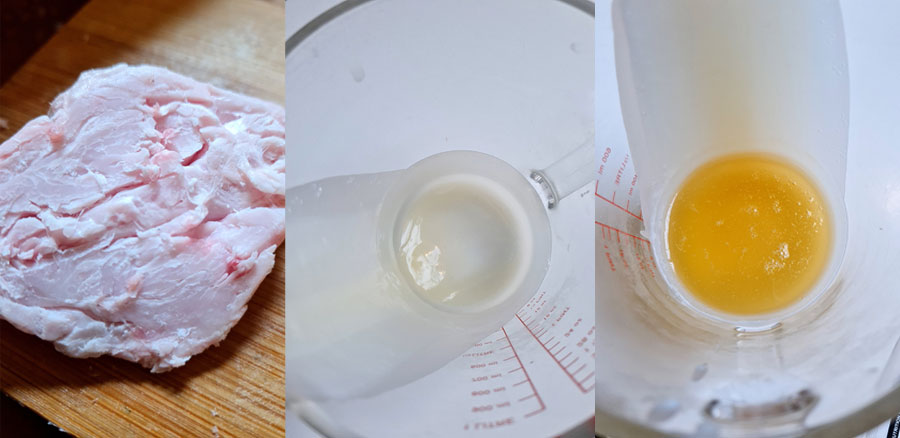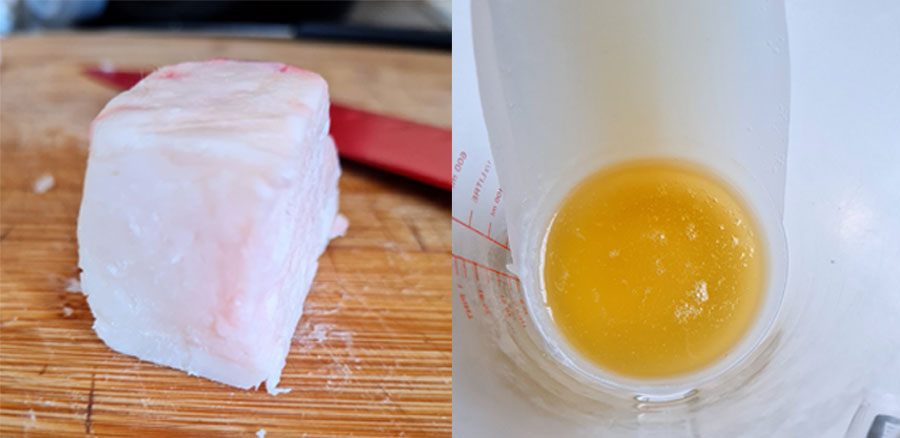What is rendered animal fat (tallow)?

AM1NAH’s Halal Tallow Fats are traditionally rendered animal fats; a nutrient-dense food that is fast becoming popular due to its nutritional profile. Much like olive, avocado and coconut oil, tallow fat consists mostly of saturated and monounsaturated fat. Most people have never cooked with tallow fat before because they grew up under the mantra: skip the animal fat and replace it with unsaturated plant-based oils. A lot of ancient and traditional food preparation such as slowly-simmered bone broth and pickled vegetables in apple cider vinegar are, in fact, some of the best cooking techniques for ensuring that we are consuming a nutrient-dense halal and tayyib diet. Cooking with tallow fat is the latest health food re-discovery (since bone broth) so once again it turns out that our forefathers were eating correctly. Alhamdulillah for everything!
The Paleo, GAPs, Nourishing Traditions, WA Price and traditional real foods movements have recently rediscovered the key benefits that healthy pure nourishing good fats play in our diets and in particular the essential role good fats play in developing children’s bodies and brains.
Many refer to tallow as an ‘old fashioned traditional fat’ because historically, it was the primary fat used for cooking and frying thanks to its unusually high smoke point. However, tallow was replaced with refined vegetable oils (such as canola), when some studies claimed that saturated fats cause heart disease. When you think of glowing skin or disease prevention, rendered animal fat is probably not the first thing that comes to mind. However, tallow is a saturated fat that you will want to keep stocked in your pantry for its numerous health benefits and countless uses.
The problem with poly-unsaturated vegetable oils
When studies came out in the 1970’s linking a diet high in saturated fat with an increased risk of heart disease, we made saturated fat the “black sheep” of the food pyramid. Recent findings have now proven that a lot of those studies were not ever published as this is not proven to be true. There are a lot of health benefits of traditional, natural, unrefined saturated fats such as tallow fat, ghee and virgin coconut oil.
Most vegetable oils are high in poly-unsaturated fats which are unstable. As a result, they produce a lot of free radicals when heated; those free radicals can harm your body at the cellular level, causing problems such as inflammation and an increased risk of developing degenerative diseases (Cancer, Alzheimer’s, Heart disease etc)
The health benefits of cooking with tallow

- It can boost your immune health – with unprocessed animal fats such as lamb and beef tallow in your diet, it is easier for your body to absorb fat-soluble vitamins that will support your immune system.
- Tallow is rich in nutrients – not only does it help you absorb more nutrients from your food, but our beef tallow is also rich in vitamins A, D, E, K, and B1.
- Tallow reduces inflammation – tallow contains conjugated linoleic acid, which is a natural anti-inflammatory. One of the fatty acids in beef tallow – palmitoleic acid – possesses fantastic antimicrobial properties, which may help to ward off infections.
- It’s good for your nervous system – tallow is high in choline, a nutrient that supports the nervous system. Also, the healthy fatty acids help to protect nerve cells.
- It helps the body burn fat – consuming healthy fats stimulates the release of glucagon, the hormone that signals to your body it’s time to burn stored fat to use for energy.
- It’s skin food – the saturated fat found in tallow nourishes your skin’s cell membranes, which helps to keep skin smooth. You can also use tallow on your skin as a natural moisturiser!
- It protects your body from free radical damage – not only are you avoiding the free radicals that your body would have to deal with if you cooked with some vegetable oils, but tallow is also rich in vitamin E, which helps to protect your cells from free radical damage.

